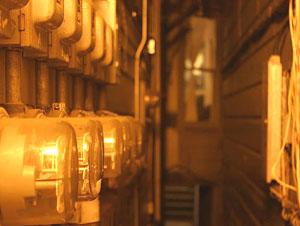Neighborhood energy conservation
(Image: Flickr user Thomas Hawk (cc: by-nc-sa))
The following is not a full transcript; for full story, listen to audio.
It’s widely believed that if you knew how much energy you used every day, you’d be more motivated to cut back. But what if you also knew how much your neighbors used? Would you be even more careful not to hog resources?
The city of Sacramento is experimenting with an energy awareness system in the hopes that it will push residents to conserve energy. It’s a start-up project by a company called Positive Energy.
On "The Takeaway," Robert Cialdini, the mind behind that Positive Energy and a professor of social psychology at Arizona State University, explained how the system works:
"It’s not peer pressure, it’s peer proof. It’s not coercion, it’s not forcing people to do anything all all. It’s just honestly informing them of what their neighbors are doing, which becomes a validating source of information about what they should do in that situation.
"I just saw an article recently that showed that if a restaurant owner puts on the menu, ‘this is our most popular item,’ it immediately becomes 20 percent more popular. There’s no pressure there, it’s just information that tells people what’s appropriate for them to be doing in that situation too."
Cialdini says there is research showing that, when people are informed that they are using more energy than their neighbors, they will decrease their use; on the flip side, when people are informed that they are using less energy than their neighbors, they will begin using more.
He explains how to keep the conscientious energy consumers from increasing their use, "We recognize them for their good acts and that keeps them nailed down below everybody else.
"It’s important that we not just ask people to conserve energy, but that we acknowledge them when they do — that’s important."
In Sacramento, residents get statements that show where they stand, month-to-month, in their energy usage compared to their neighbors, in homes that are comparable in size to theirs.
"That information alone … has produced the single most cost-effective practice in any of the utilities where Positive Energy has been contracted," said Cialdini. "In Sacramento, in one year, they’ve saved enough to take 30 – 50 thousand homes off the energy grid."
Ultimately, government policies can be informed by these kinds of practices which don’t require financial resources for large-scale technological fixes, as well as regulations or incentives, says Cialdini.
"The Takeaway" is a national morning news program, delivering the news and analysis you need to catch up, start your day, and prepare for what’s ahead. The show is a co-production of WNYC and PRI, in editorial collaboration with the BBC, The New York Times Radio, and WGBH.
Every day, reporters and producers at The World are hard at work bringing you human-centered news from across the globe. But we can’t do it without you. We need your support to ensure we can continue this work for another year.
Make a gift today, and you’ll help us unlock a matching gift of $67,000!
